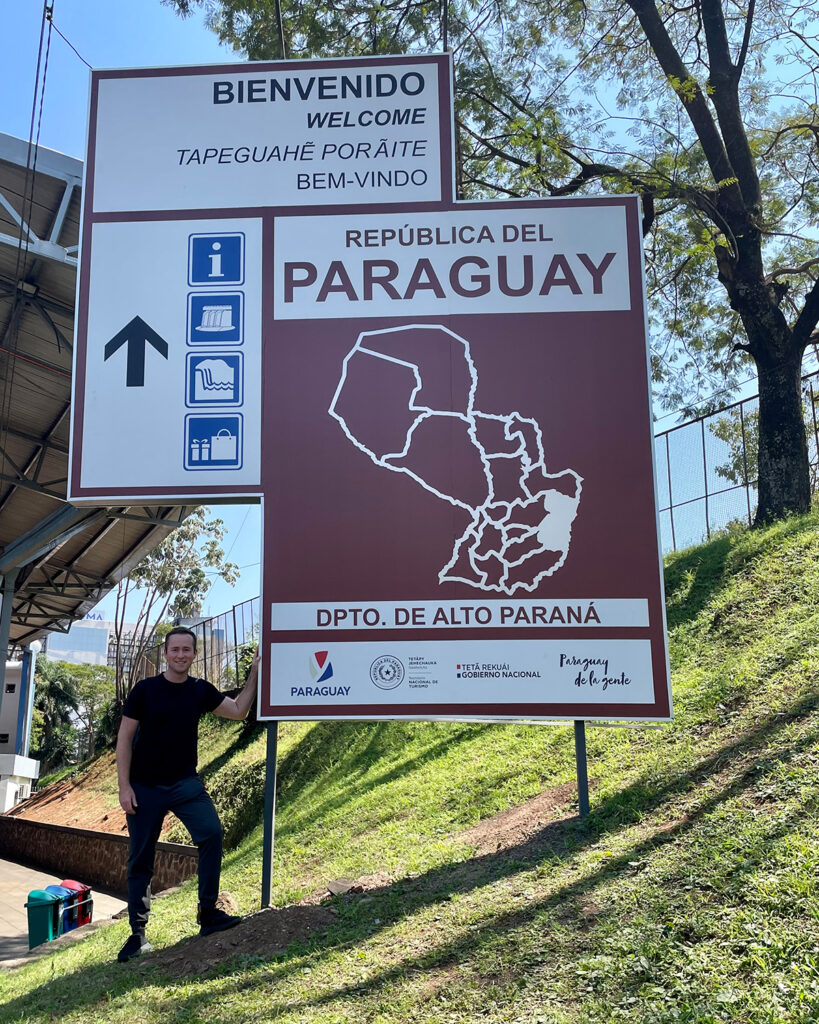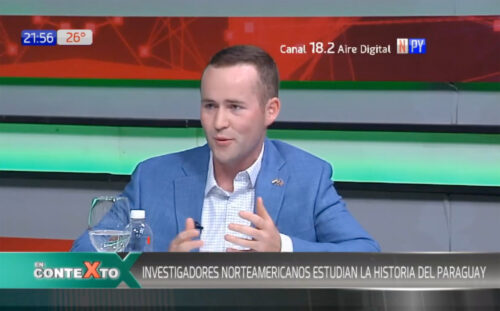A DukeEngage program asked students to envision new development possibilities for Paraguay, a small South American country with a big electricity surplus. Two years post-DukeEngage, alum Austin Connors traveled to Paraguay as a Fulbright Scholar to research its energy policies amid ongoing debates.
Austin Connors knows exactly how he ended up as a Fulbright Scholar in Paraguay: “My steps were DukeEngage, thesis, Fulbright,” he said.
A history and Spanish double major at Duke University, Connors applied to a DukeEngage program in Paraguay in 2020.
“I applied to DukeEngage wanting to go to South America,” he said. “I also wanted to work in the social sciences, but pertaining to energy.”

DukeEngage Brazil-Paraguay fit these criteria. It was centered on the Itaipú Binational Dam, one of the largest hydroelectric dams in the world, which stands on a river between Paraguay and Brazil and is shared by the two countries.
Duke cultural anthropology professor Christine Folch has written extensively about the Itaipú dam, most notably in her book “Hydropolitics: The Itaipu Dam, Sovereignty, and the Engineering of Modern South America.” Along with Luana Lima, a Brazilian energy expert, Folch created this DukeEngage program to offer an energy-related research opportunity for undergraduates.
Connors didn’t have a connection to Paraguay at the time. “But I was captivated by the project and the opportunities that could arise from it, and Dr. Folch’s enthusiasm,” he said.
Unfortunately, the COVID-19 pandemic made traveling impossible in the summer of 2020. But like Connors, the other DukeEngage students were so keen on the opportunity that all of them decided to participate in the program remotely, with the help of partners on the ground.
During their DukeEngage summer, the students worked on policy proposals for Paraguay’s recovery post-pandemic. Realizing that Paraguay’s abundant hydroelectric energy could help the country economically, Connors researched the potential production of green hydrogen to attract foreign investment.
“You need electricity and water to make hydrogen, and it’s green hydrogen when the electricity is renewably sourced,” he said. “Because of Itaipú, Paraguay has an abundance of renewable electricity.”
The students’ Zoom presentation received a lot of attention in Paraguay. “The president of the country was asked about our presentation in a primetime news interview, and he knew about it,” Connors said.
“The country receives very little foreign academic interest,” he explained. Currently, DukeEngage is the only annual program funded by a university in the United States that sends undergraduate students to Paraguay.
When he returned to his studies at Duke, Connors decided to focus on Paraguay in his senior thesis. With support from his advisor, history professor John D. French, he researched U.S. President Rutherford B. Hayes’ role in arbitrating territory in South America after the War of the Triple Alliance (1864-1870), which devastated Paraguay. Because Hayes ultimately favored Paraguay over Argentina in a territorial dispute over a region called the Chaco, Connors says, he is something of a national hero there. (Connors later published a section of his thesis in the Paraguayan State Department-equivalent’s research journal.)
Connors was awarded high distinction for his thesis in May 2022. And thanks to a successful application for a Fulbright research scholarship, he was finally able to travel to Paraguay that fall.
Fulbright Scholars sometimes experience difficult adjustments when they arrive in their host countries, and the program does not have a commission in the U.S. Embassy in Paraguay to support the grantees. Fortunately, this was easier for Connors because of his experience.
“DukeEngage made the transition easier,” he said. “I knew cultural things, I knew historical traits…I had a small network of people on the ground.”

Connors’ grant period coincided with preliminary renegotiations between Paraguay and Brazil over Annex C of the Itaipú treaty, which governs financial terms. Paraguay and Brazil are each entitled to 50% of the dam’s electricity, but Paraguay only uses a fraction of that. It has historically sold its excess energy to Brazil.
“This is the overall debate in Paraguay right now: how this energy should be priced in order to best utilize it,” said Connors. “The more specific question is: which industries are trying to use the energy, and which make sense in terms of investing back in the country? The academic argument is that the energy should be used for industry, but not at the expense of the natural environment.”
In investigating various industry proposals, Connors said, “I’ve learned about data centers, crypto mining, aluminum, and car part manufacturing.” All of these electro-intensive processes have the power to jumpstart development, he said, but social and political factors in Paraguay pose some limitations.
In addition to writing an article with Christine Folch about the energy renegotiations, Connors focused on an economic history project. “I worked on a couple of case studies of failed investments to figure out what went wrong, and to better understand the foreign investments that are being made today.” His article about an attempted investment by Reynolds Aluminum in the ‘70s and ‘80s was recently published in Scientia, a Paraguayan journal.
Itaipú treaty renegotiations are still ongoing, and their outcome is uncertain. But gaining a better understanding of Paraguay’s national politics, Connors said, “has helped me better understand the region as a whole and how the U.S. — both public and private sector entities — operates in South America.” Currently an active-duty U.S. Army officer, he plans to continue a career in government and international affairs.
He is clear about what set him on his current path.
“All of it traces back to DukeEngage,” he said. “When people asked why I was in Paraguay — which happened more frequently than I expected — I said, ‘Because I worked on a project.’ And that project was DukeEngage.”
